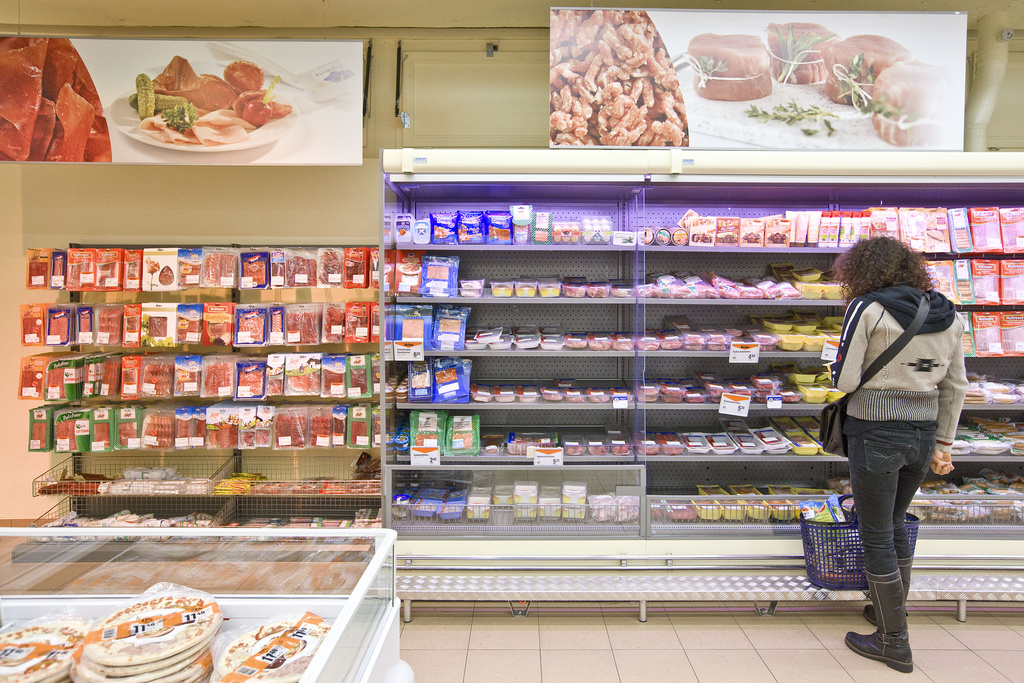
Traders short change Swiss consumers

Swiss consumers are not reaping the price benefits of cheaper imports from Europe despite the euro steadily losing ground to the Swiss franc.
Last week the economics ministry confirmed what has long been suspected: consumers only partly enjoy lower prices for products imported from the eurozone.
The news was followed by June’s price consumption statistics, which revealed that overall, the prices of imported goods and services had not changed compared to a year ago.
Switzerland ranks among “the countries where exchange rate variation transfers are rather below the norm”, the ministry said in a statement.
The economics ministry remains prudent, however, declaring that the issue needs “closer analysis”.
According to the ministry, the situation varies according to the product. For oils and their derived products, fluctuations in the exchange rate are quickly passed on to the final price.
But in the automobile sector the prices of vehicles are “not linked to the evolution of prices in the manufacturing country or to exchange rate variations”.
Textiles, clothing, leather items and shoes are more “striking” examples, it added, as “the Swiss consumer price index has steadily increased for these segments”.
Swiss consumers are well used to paying 20-30 per cent more for the same goods as their European neighbours. But the recent data leaves the impression that Swiss consumers, who generally enjoy a high purchasing power, are being constantly milked.
However, Swiss consumers are starting to kick up more of a fuss.
According to the French-language La Liberté newspaper, Swiss price watchdog supervisor Stefan Meierhans has received more complaints on this issue this year than during the whole of 2010.
Little room for manoeuvre
Mathieu Fleury, secretary general of the consumer federation in western Switzerland, is highly critical.
“It’s true that the situation is different in Switzerland but exchange rate variations automatically enable European products to be sold at lower prices,” he told swissinfo.ch.
The calculation is an easy one: when one euro was worth SFr1.5, a product purchased for SFr15 and sold for SFr30 generated a SFr15 profit margin. Today with the euro at SFr1.2, the same product could be sold for SFr27 with the same margin.
Despite growing public activism, Swiss consumer groups have little room for manoeuvre.
“From a legal point of view our only possibility is to speak to the Competition Commission to find out if there is a tacit agreement going on between actors that aims to not pass on exchange rate variations to product prices. When you see competition not working, this suspicion is legitimate,” said Fleury.
The large retailers are not the only ones to blame, says the secretary general.
“The Swiss market is dominated by official importers and that just adds to the fact that prices don’t move,” he added.
Cut-price articles
Urs Meier, spokesman for the retail group Coop, confirmed his remarks.
“We systematically pass on advantageous exchange rate variations to our sales prices. But lots of people ignore the fact that 95 per cent of European products we sell arrive in Switzerland via general importers with whom we have contracts in Swiss francs based on a fixed exchange rate of one euro for SFr1.35,” said Meier.
Coop says it tries to pressure importers and “despite tough resistance” has managed to obtain lower prices for various products.
“Since the end of 2010 we have reduced the prices of 2,150 articles, including 600 resulting from a drop in the euro,” said the spokesman.
Migros, the other Swiss supermarket giant, says it cannot do very much, even if the prices of some 3,500 products on its shelves have fallen.
“The volume of goods bought in the eurozone is around six-eight per cent, worth around SFr300 million a year,” said Migros spokeswoman Martina Bosshard.
Border shoppers
But these arguments do not seem to hold much sway with Swiss consumers. More and more people are driving over the borders to do their shopping in French, Italian, Austrian and German supermarkets.
On Monday night’s 10vor10 programme on Swiss television, Economics Minister Johann Schneider-Ammann said he understood families who wanted to make savings in this way: “I think it’s good that in a free market everyone seeks to buy goods in the best possible manner.”
According to Coop head Hansueli Loosli, cross-border shopping by the Swiss is costing companies like his some SFr2 billion per year. And it is not limited to supermarket products.
“Direct imports of new cars have increased by six per cent since the start of the year versus 3.5 per cent in 2010,” Andreas Burgener, director of the car importers’ association Auto-Suisse, told the German-language NZZ am Sonntag newspaper.
“We don’t want prices to become too volatile. But the present situation shows that consumers can become mobile and benefit from a favourable exchange rate,” said Fleury. “Swiss businesses have to hurry up and pass on exchange rate variations to their prices much quicker.”
The Swiss franc is a so-called “safe haven” currency, which means that investors and speculators buy it when other currencies, including the euro and the dollar, are under pressure.
The franc has gained 25 per cent in value against the euro and the dollar over the past four years.
The Swiss National Bank has emphasised that it does not pursue an exchange rate target, but consistently bases its monetary policy on its legal mandate.
This mandate stipulates that “the SNB is required to ensure price stability, while taking due account of economic developments”.
Starting in March 2009 the SNB intervened in currency markets. But after pumping in 15 per cent of GDP in May 2010 to little effect as the Swiss franc surged during the first round of the Greek debt crisis, it dropped them in June 2010.
These forays led it to a loss of SFr21 billion last year, its biggest ever, and Chairman Philipp Hildebrand has faced calls to resign.
(Translated by Simon Bradley)

In compliance with the JTI standards
More: SWI swissinfo.ch certified by the Journalism Trust Initiative











































You can find an overview of ongoing debates with our journalists here . Please join us!
If you want to start a conversation about a topic raised in this article or want to report factual errors, email us at english@swissinfo.ch.